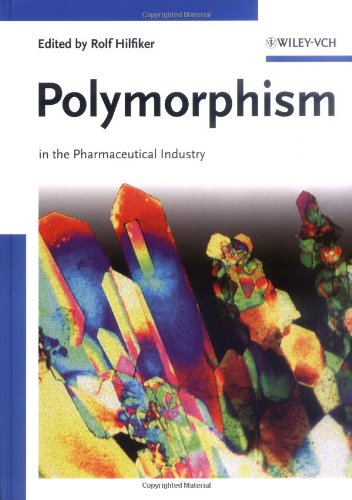Polymorphism in the pharmaceutical industry epub
Par thomas anna le lundi, juillet 18 2016, 15:56 - Lien permanent
Polymorphism in the pharmaceutical industry by Rolf Hilfiker


Polymorphism in the pharmaceutical industry Rolf Hilfiker ebook
Publisher: Wiley-VCH
Page: 433
ISBN: 3527311467, 9783527311460
Format: pdf
Polymorphism – is your pharmaceutical company in good shape? According to George Tranter from Chiralabs, “Crystallisation is one of the biggest problems of the pharmaceutical industry”. _ Naturally, polymorphisms in drug-metabolizing enzymes is an important factor that is well known, described, and included in the Medical Compendium designed for physicians; yet, these polymorphisms are not widely taken into consideration targets, including rhodopsin-like G protein– coupled receptors (GPCR), protein kinases, ion channels, proteases, and enzymes, as they have classically been used by the pharmaceutical industry before the use of novel genomic technologies. Processing-induced Phase Transformations and Their Implications on Pharmaceutical Product Quality. Screening for polymorphs is crucial for drug research and development, since the crystal form of the active pharmaceutical ingredient (API) directly correlates with its pharmacokinetic properties. 2009;11(4):740-6; Govindarajan R, Suryanarayanan R. Amylose is one of the most important raw materials for industrial applications. The availability of new molecular approaches to the selection of drug therapy is an emerging need, as the traditional approach based on the evaluation of patient and tumor characteristics is clearly far from optimal. Cost-effective methods for genotyping are being developed and it would For the pharmaceutical companies, segmentation of the market may not leave room for conventional blockbusters but smaller and exclusive markets for personalized medicines would be profitable. Possibly no more than http:// pharmaceuticalintelligence.com/2013/05/11/arterial-elasticity-in-quest-for-a-drug-stabilizer-isolated-systolic-hypertension-caused-by-arterial-stiffening-ineffectively-treated-by-vasodilatation-antihypertensives/. This text introduces the basic concepts and discusses their wider implication for pharmaceutical development, with reference to many case examples of current drugs and drug products. The knowledge of the effects of polymorphisms of genes for the enzymes is applied in drug discovery and development as well as in clinical use of drugs. Crystallization processes have been commonly used in the pharmaceutical industry to purify and generate APIs. It has been widely used in a variety of fields, such as light industry, food industry, pharmaceutical industry, production of films. This is an interesting genomic study of the relationship of genetic polymorphism in the Chinese Uygur population that highlights the difficulty in CVD genomics, and casts a promising light on difficulties over. In his painstakingly 275-page decision, the single judge, Justice Manmohan Singh opined that the generic product Erlocip manufactured and sold by Cipla contains polymorphic B variant of Erlotinib hydrochloride as active ingredient and hence do not infringed the compound per se claims of the It is likely that the reasoning of this decision may add yet another disappointment and further dismay for the pharmaceutical companies in enforcing their patents in India . All you want to know about Drugs, live, by DR ANTHONY MELVIN CRASTO, Worlddrugtracker, Helping millions, million hits on google, pushing boundaries, one lakh connections worldwide, my soul in action for you .. To follow text highlighted with relevant pharmaceutical examples; Self-assessment assignments in a variety of formats; Written by authors with both academic and industrial experience; Companion website with further information to maximise learning 7.4.1 Thermodynamics of polymorphism 133. Could exert a profound effect on the solid-state properties of that system, the pharmaceutical industry is required to take a strong interest in polymorphism and solvatomorphism as per the regulations laid down by the regulatory authorities. Comprehensive reference for researchers in the field of cancer pharmacogenomics and clinicians, from both academia and industry; Provides a collection of multi-disciplinary topics; Covers the most important aspects of pharmacogenomics applied to cancer patients.